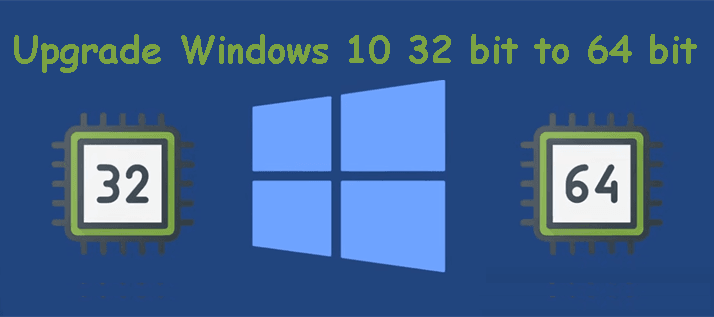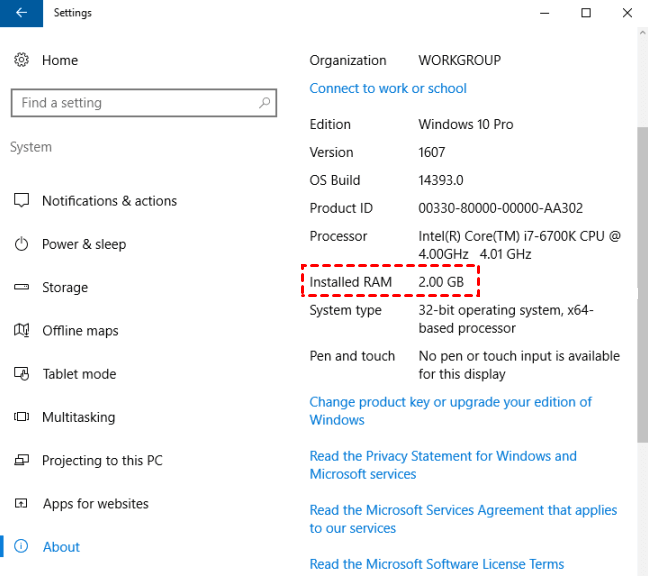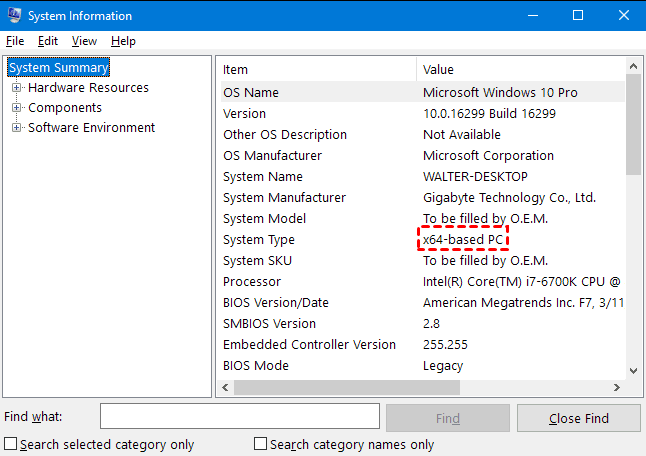Be sure your computer meets the upgrade requirements and you have a copy of your important data. Then you can upgrade Windows 10 from 32 bit to 64 bit without losing data.
Microsoft only allows users to upgrade from a qualifying version to its equivalent edition on the same architecture, but many users want to upgrade Windows 10 32 bit to 64 bit without losing data. Why is it? Here are some advantages of the Windows 10 64-bit system:

These days PCs usually have 8GB or more, 4GB RAM is not enough to run more apps and may affect the experience, so many users want to upgrade from Windows 10 32-bit to 64-bit. Before upgrading, you need to be sure the processor supports 64-bit, your computer has 2GB memory or more, and your drivers are compatible with 64-bit.
Step 1. Click Settings > System > About and check the Installed RAM details. Or Right-click This PC and select Properties. Confirm it is 2GB or higher.

Step 2. Scroll down to Device specifications, and check the System type details. Confirm it says "32-bit operating system, x64-based processor". Or directly search System Information to check if the System type shows "x64-based PC".

Step 3. Determine the CPU compatibility and confirm Physical Address Extension (PAE), No-eXecute (NX), Streaming SIMD Extensions 2 (SSE2), and CMPXCHG16b (CX16) are present on the processor.
Step 4. Go to the manufacturer’s website and confirm the other components (eg: graphics and sound cards) have 64-bit version drivers.
After confirming you can upgrade to Windows 10 bit, in order not to lose data or programs, you still need to backup the system with free backup software like AOMEI Backupper Standard. Microsoft does not offer an in-place upgrade to switch 32-bit to a 64-bit system, but only formats your disk and cleanly installs a fresh version of a 64-bit system.
With it, you can revert Windows 10 64-bit to 32-bit if you don't like this new version or it is not bootable. And you can also view images and restore files or folders you want. Besides, you still can use it to schedule backup systems and changes on Windows 10 for disaster recovery.
Please download free backup software - AOMEI Backupper Standard. Install and launch it.
Step 1. On the main page, click System Backup under the Backup tab.
Step 2. As shown below, AOMEI Backupper has already chosen the system partition and other boot partitions required to start your computer. Here, you only need to select a destination path for your backup. After that, click Start Backup.
Tips: ★ Unexpected human errors may result in system boot failure during a clean install. It's suggested to create a bootable disc with AOMEI Backupper just in case. ★ You still can set Options, Schedule Backup, and Backup Scheme to backup Windows 10 continuously. Some of them are available on the Professional version or higher.
After backing up system, your data are safe, so you can safely upgrade Windows 10 32-bit to 64-bit. The only way is to clean install Windows 64-bit system on your Windows 10 32-bit. You need to create an installation media to start your computer first.
Step 1. Connect a USB drive with at least 8GB of available space. Go to Microsoft's Windows 10 download page, click the Download tool now button from Create Windows 10 installation media, and save it to your PC.
Step 2. Double-click the MediaCrationTool.exe file to run it and accept the license terms.
Step 3. Tick Create installation media for another PC and click on Next.
Step 4. Tick Use the recommended options for this PC or select language, architecture, and edition manually. Then click Next.
Step 5. Select the USB flash drive option and click Next.
Step 6. Select the removable drive from the list and click Next. It will start creating Windows 10 installation disc, just wait until the process is complete and click Finish.
Step 1. Plug your USB flash drive into the computer with a Windows 10 32-bit system. Restart your computer and set boot priority to USB flash drive via BIOS, save changes, and reboot. Press a key if you are asked.
Step 2. Wait for Windows 10 installation disc to load, once done, set up language and other preferences and click Install now.
Step 3. Accept the license terms and click Next.
Step 4. Select Windows 10 installation type: Custom. It will delete files, or uninstall programs currently on your computer. If there are any important data, please backup files to external hard drive first.
Step 5. Click Drive Options and delete all partitions until it shows unallocated space, here is Drive 0 Unallocated Space. Select it and click Next to clean install Windows 10 64-bit system. Or you can directly use the existing system partition to install Windows 10 if it has enough space.
Note: This operation can also be applied to upgrade Windows 7 32 bit to 64 bit, upgrade Windows 8 32-bit to 64-bit, and upgrade Windows 11 32-bit to 64-bit.
To upgrade Windows 10 32-bit to 64-bit without losing data, you still need to restore files from backup. Here are two methods below:
1. Restore from file backup. If you create a file backup separately, you can directly go to the Restore tab and select file backup to restore files from backup in Windows 10.
2. Restore file from system image backup. Restoring from a system will overwrite the 64-bit system. So if you are in this situation, try Explore Image tool on the Professional version. Refers to: selective file restore.
Windows Update is a helpful feature for computer users to receive security updates or critical updates, which helps to fix bugs or enhance their computer security. Microsoft released Windows 10 21H2 feature update that focuses on productivity, management, and security as well as the latest Windows 10 22H2.
You can enjoy the following features in Windows 10 21H2:
The main thing the Windows 10 22H2 release brings is an extension to the life cycle for Windows 10. Windows 10 22H2 Home and Pro editions will receive 18 months of servicing, while Enterprise and Education editions will get 30 months.
Please go to Settings> Update & Security> Windows Update, and click the Check for updates button to download and install the latest updates as well as missing drivers.
You can easily upgrade Windows 10 32-bit to 64-bit without losing data as long as your computer meets the upgrade requirements and you backup your system or important files and folders. If you are worried about the boot issue, please create a bootable disc as well.
Also, it's suggested to keep AOMEI Backupper installed on Windows 10 64-bit system, which helps you backup only changed files per day automatically and manage disk space in a professional way. So you always have a copy of data up-to-date and be sure it is safe.